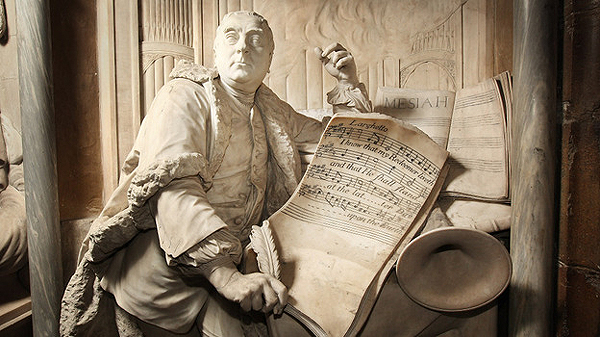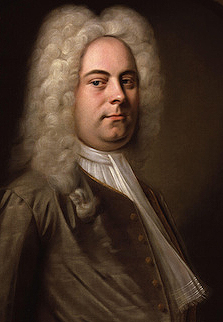|
Prepared Beforehand by Rolaant McKenzie |
||
|
The Thirty Years' War was a series of conflicts between various nations, mainly in Central Europe, involving religious, territorial, dynastic, and commercial rivalries. Taking place from May 23, 1618, to October 24, 1648, it was one of the longest and most destructive wars in European history, costing an estimated 4-8 million lives from battle, famine, and disease. Many areas in present-day Germany were especially hard hit, losing more than half their populations. Valentin Handel was a coppersmith and respected member of the Halle city council in Saxony (a state in present-day eastern Germany). Georg Handel (September 24, 1622 - February 11, 1697) was born to him and his wife Anna, but the war came to their city and brought great devastation. While Georg and his mother survived, Valentin died of the plague when Georg was 14. In 1683, a year after the death of his wife Anna, Georg married Dorothea Taust, the daughter of a Lutheran pastor. Three years later, Georg Friedrich Handel (February 23, 1685 - April 14, 1759) was born. According to John Mainwaring's Memoirs of the Life of the Late George Frederic Handel (1760), the junior Handel had a strong inclination toward music, but his father urged him to pursue a career in civil law and discouraged him from playing any musical instruments. But he managed to secretly acquire a small clavichord and become proficient at playing it at night while his family slept. Somewhere between when he was seven and nine years old, Handel and his father went on a trip to Weissenfels in central Germany to visit a male relative who was serving as a valet to Duke Johann Adolf I (November 2, 1649 - May 24, 1697). It is said that the young Handel found his way to the court organ in the palace's Chapel of the Holy Trinity and amazed everyone with his musical skill. He attracted the attention of the Duke, who recommended this musical prodigy be permitted to take lessons in musical composition and keyboard technique from eminent organist Friedrich Wilhelm Zachow.
Over the next decade, Handel enjoyed increasing success in his musical career. In 1712, he moved to England to settle permanently and became a naturalized citizen. There he composed numerous operas, oratorios, and other works that brought him great renown. Disaster struck when Handel suffered a stroke in the spring of 1737 that caused temporary paralysis in his right hand and arm. A subsequent stroke after a brief recovery caused some deterioration in his mental capacities. Following the advice of his doctor, Handel reluctantly took a break from his work and took advantage of the medical spa therapy available at Royal Tunbridge Wells. By the end of the year, all the symptoms of his stroke had disappeared. During this time, Handel became friends with Charles Jennens (1700 - November 20, 1773), a devout Christian, wealthy English landowner, and patron of the arts. Jennens authored a number of libretti, texts intended to be used for lengthy musical works such as operas or oratorios. In a desire to counter the growing influence of Deism (a belief in a God who does not intervene in the affairs of men) and proclaim the gospel to people who did not usually attend church, Jennens wrote the libretto Messiah, created entirely of biblical passages documenting prophecies about Jesus' birth, death on the cross, and resurrection, which he gave to Handel to compose an oratorio. The music for Messiah was completed on September 14, 1741, just 24 days after Handel began working on it. It is said that he never left his house during this time. According to early-music scholar Richard Luckett's Handel's Messiah: A Celebration (1992), the number of errors in the original 259-page score was incredibly low for a composition of this length. After Handel wrote the "Hallelujah" chorus, he exclaimed to a visiting friend with great emotion, "I did think I did see all Heaven before me, and the great God Himself!" Not wanting praise for himself for this work, at the end of the score manuscript he wrote the letters SDG for Soli Deo Gloria, meaning "Glory to God alone." Contrary to the Deists, Handel believed, as did Jennens, in God, who not only created the heavens and the earth but did not abandon the creation to run itself. He could see the intervention of God in his own life. The devastation of a long war in his homeland could have ended his father's life through violence or disease, as it did his grandfather, and the junior Handel would not have been born. His father could have succeeded in causing him to abandon his calling to music and embrace a civil law career. Handel may not have emigrated to England and befriended Jennens or miraculously recovered from a stroke that could have ended his musical career. He realized that God placed him where he was with the talents he had to glorify Him and be an instrument of His blessing to those around him and beyond. Messiah was first performed on April 13, 1742, at the Great Music Hall in Dublin, Ireland, to great acclaim. It went on to be performed in theaters, concert halls, and churches in London and elsewhere. For more than 280 years, this masterpiece of music accompanying the words of Holy Scripture has moved audiences around the world, delivering the message of the greatest intervention of God in the world: demonstrating His love by sending His Son Jesus to reconcile lost humanity to Himself through His living the perfect life we could not live, dying on the cross the death for sin that we deserved, and rising again from the dead to guarantee eternal life to all who trust in Him. While many of us have not had the same kind of life as Handel, we can look back on our lives and recognize God's involvement in maintaining us and, at times, arranging our steps. God created and sustains all things, and He "made from one man every nation of mankind to live on all the face of the earth, having determined their appointed times and the boundaries of their habitation" (Acts 17:26). We are in this place and time in history because we are supposed to be. Discover the gifts that God has given you and the talents that you have. He will guide you if you ask Him in faith (James 1:5-8).
Fulfill the role God has for you in the world. The good that you do in Jesus Christ can, like Handel's music, be like a stone thrown into a pond, the ripple effect expanding outward and benefiting others even long after your time on earth has ended, and leading to eternal reward (1 Corinthians 3:5-15). Then, with the angels and all creation, we will give praise to God as in the final chorus of Messiah, based on Revelation 5:11-14:
|
||
| What Is the Gospel? | What Must I Do to Be Saved? | Home | Contact Us | Return | ||

